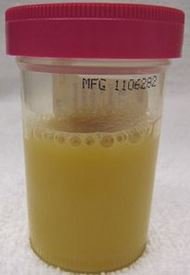What is Pyuria?
Pyuria is the presence of white blood cells, also known as pus cells, in urine. The commonest cause of pus cells in urine is an infection within the urinary system, mostly the bladder though it could also involve a kidney infection.

And, while infections are the major cause of white blood cells in urine, accounting for 98 to 99 percent, there are also other reasons. Pyuria, by itself is not a disease, but rather a finding of a laboratory examination. It’s also not an applicable medical diagnosis.
Pyuria is detected during a laboratory finding, and is an indicative of numerous health conditions associated with the urinary tract. The presence of white blood cells or leukocytes, or pus cells is detected by urinalysis. Upon detection, further testing may be ordered to help determine the cause of pus cells in urine and the right treatment to apply.
If a patient has asymptomatic pyuria with no infection, there may be no treatment required, nonetheless, if UTIs are identified as the cause, then pharmacological management is needed.
Sterile
Sterile pyuria implies persistent presence of white blood cells in urine without bacteria, and this could indicate a renal disease. When there is no bacteria invasion found in urine, but there is large presence of white blood cells, then pyuria may be asymptomatic.
It may be difficult to determine the cause of increased pus cells in urine when there is no bacteria. The treatment and diagnosis may also be difficult. In sterile pyuria, the possible causes may be kidney diseases, tuberculosis, cancer, or drugs.
Pyuria Vs. Bacteriuria
Pyuria indicates white cells in urine that are sufficient enough to make the urine milky or cloudy while bacteriuria indicates presence of bacteria in urine.
Causes
Whenever there is irritation of body tissues, an inflammatory response is triggered. This response is in form of increased flow of blood to the irritated area, slight swelling, and infiltration of white cells in a bid to combat the irritation.
If there is any inflammation occurring in the urinary tract, it could result in increased presence of white blood cells in urine.
There are different aspects that may cause inflammation to occur in urinary system and they include:
- STIs like Chlamydia and gonorrhea
- Urinary tract infections (UTIs)
- Bladder infection or cystitis
- Prostate infections
- Infections caused by viruses such as Human Papilloma Virus and Herpes Simplex
- Inflammatory lesions occurring in the kidneys
- Parasites such as Giardia lamblia, schistosoma haematobium, trichomona vaginalis, and entamoeba histolytica
- Other infections such as tuberculosis, actinomycosis, fungal infections, and anaerobic bacteria that survive in environments with little oxygen or no oxygen at all
- Pregnancy
- Mechanical trauma
- Tumors- benign or malignant affecting the urinary tract
- Medications like glucocorticoid
Patients who have trauma or those who had had surgery done on the urinary tract system may develop pyuria, but this will heal with time. Interstitial cystitis refers to an inflammatory syndrome affecting the bladder. This syndrome may cause pyuria and comes with symptoms that reflect those of common bladder infections.
Other possible causes of pyuria are chemicals like soap or medication in bladder and urethra areas. Contamination in the vagina and retroperitoneal fibrosis are other possible causes.
Diagnosis
A doctor may diagnose pyuria in different ways and they include:
History
A doctor will ask a patient to provide information regarding the symptoms they are having. Pyuria may however occur without symptoms. It is important for a patient to seek medical attention if they notice persistent cloudy or milky urine.
This is especially so if the patient is having other symptoms like discomfort when urinating or frequently urinating.
Physical examination
A physical examination of the patient may help in diagnosing a patient of pyuria. However, this examination may not detect the presence of white blood cells in urine and therefore, a laboratory exam is always ordered.
A patient with existing malfunction or disease of the kidney may have symptoms like tenderness, fever, and enlargement of the kidney.
Tests
Urinalysis is the test performed to diagnose this condition. A doctor may also order a culture test of urine to be conducted to help determine the type or strain of bacteria that could be causing pyuria. Imaging tests may also be done using ultrasound to see if there are kidney abnormalities and infections.
Urine dipstick test is crucial and one of the important screening tools in general practice. If the dipstick findings show leucocytes or nitrite, it suggests presence of an urinary tract infection.
In the event that pyuria on dipstick becomes persistent without any urinary tract infection confirmed in urine culture, a patient may need further investigation for cases of haematuria, proteinuria, and renal function.
During Pregnancy
A pregnant woman may be at a higher risk of having urinary tract infections and bacteria in urine or bacteriuria. These could result in pyuria. The hormonal changes occurring during pregnancy predispose a woman to infections.
Proper treatment is required if a pregnant woman is suspected of having pyuria. Before using any medication, a pregnant woman should consult widely with a doctor because some medicines may be harmful to the fetus.
Treatment
If it is a case of assymptomatic or sterile pyuria without bacteria, a patient may not need treatment. Urinary tract infections are treated using antibiotics. Medications used include Ampicillin, Norfloxacin, Minocycline, Amoxicillin, Ciprofloxacin, and Doxycycline
Patients who are treated of pyuria using antibiotics and do not respond to these drugs, they may need to be evaluated further to determine the cause. Sometimes, there may even be no cause of pyuria, and this is called idiopathic pyuria.
Prevention
Pyuria may be prevented by ensuring proper hygiene.
- After defecation or urination, make sure you wipe the anal and vaginal area- the front to back way. Microbes found in anal area could spread to vagina and the urethra causing infections.
- Before and after a sexual intercourse, wash or shower to reduce the chances of honeymoon’s cystitis that may contribute to pyuria
- Proper sterile techniques are needed if you use indwelling catherers
- Take plenty of water to help in flashing bacteria from the urinary tract system.
Reference List
- Pyuria. http://howshealth.com/pyuria-definition-causes-diagnosis-treatment-prevention/
- What is Pyuria. http://www.news-medical.net/health/What-is-Pyuria.aspx
- Sterile Pyuria. https://patient.info/doctor/sterile-pyuria
- Pyuria. http://www.nejm.org/doi/pdf/10.1056/NEJMra1410052
- http://www.advuro.com/wp-content/uploads/2015/05/pyuria.pdf
- Pyuria. http://diseasespictures.com/pyuria/
